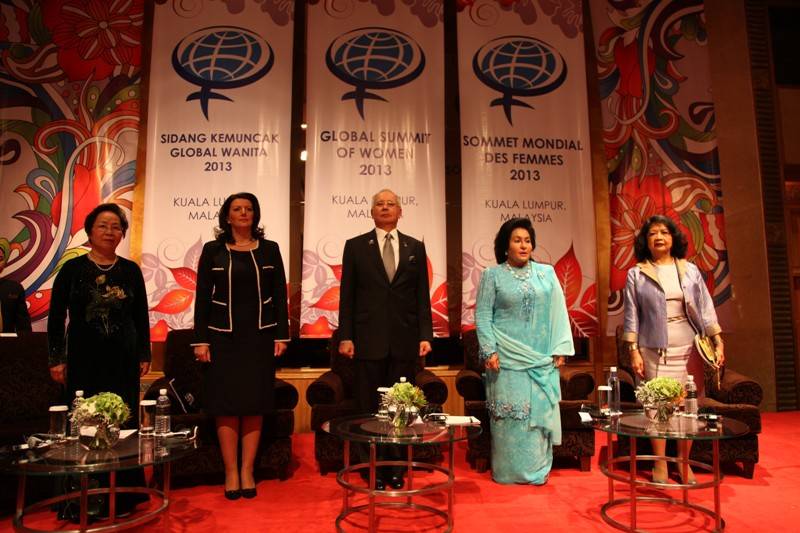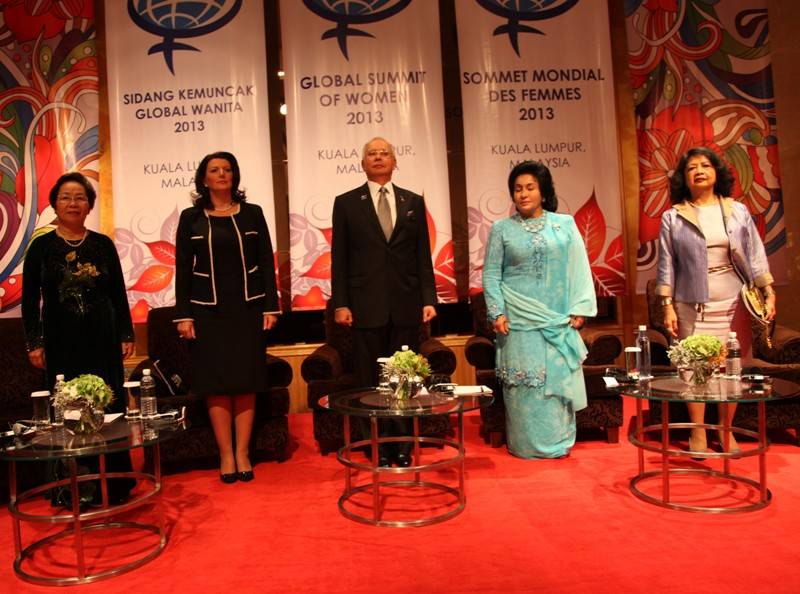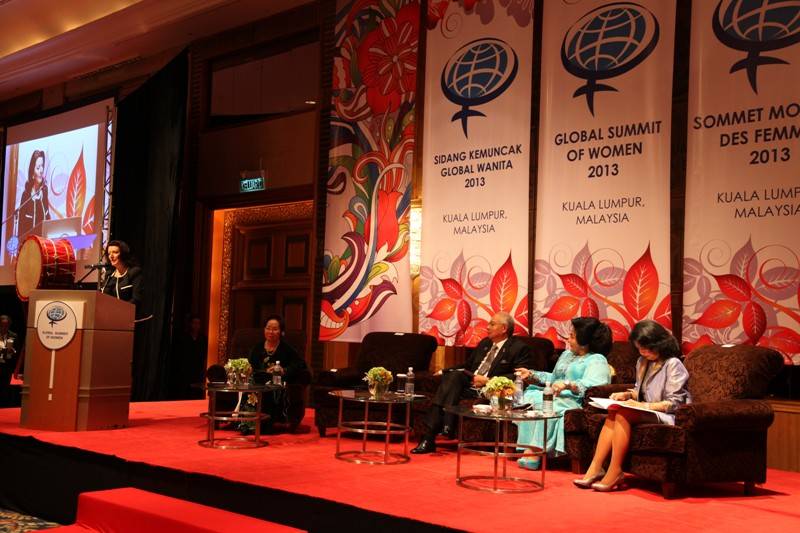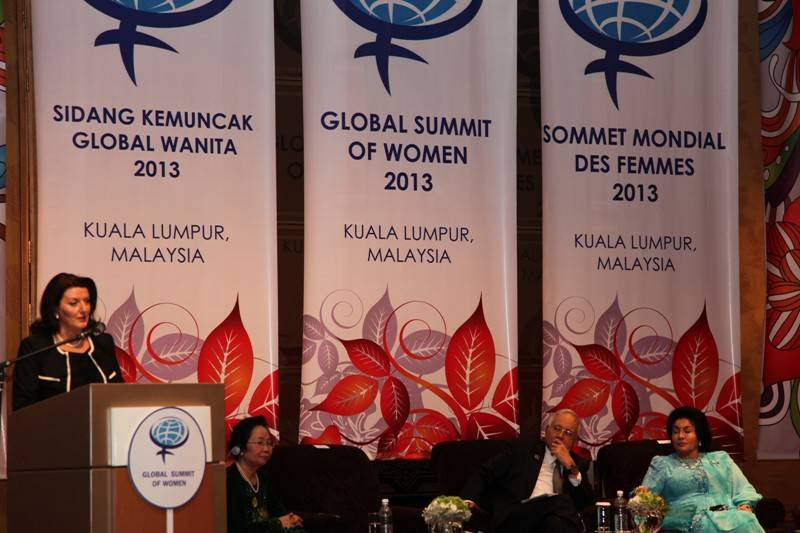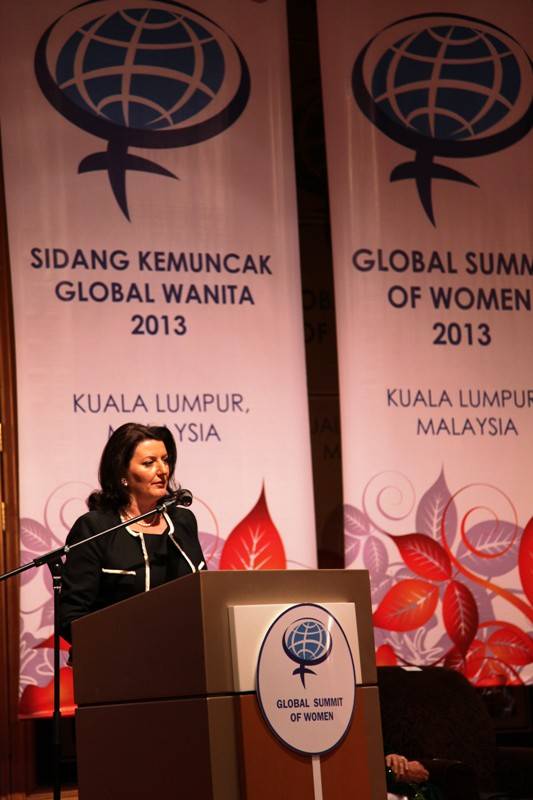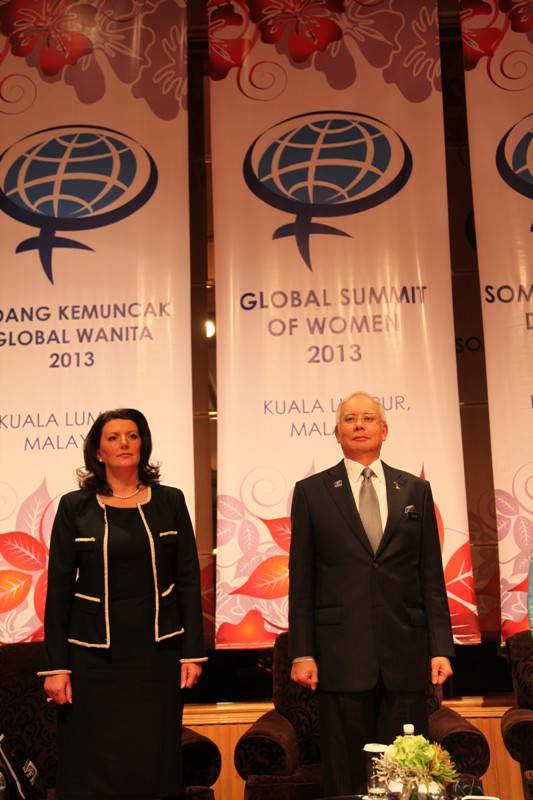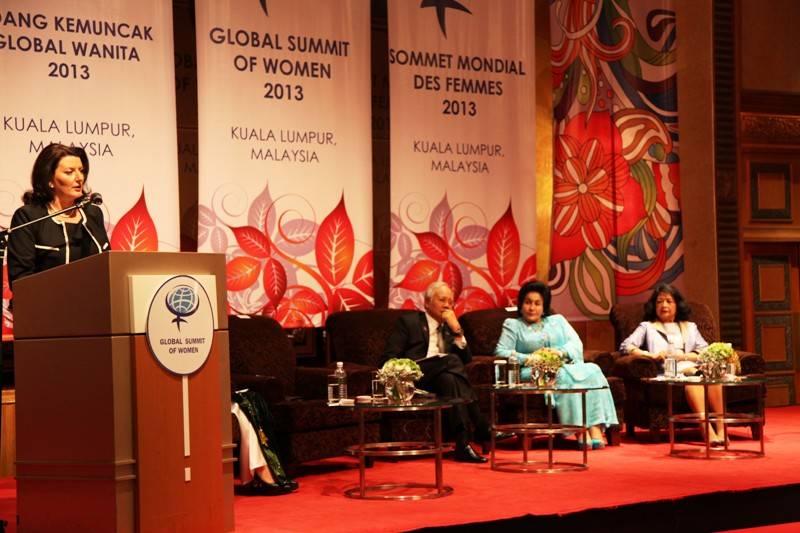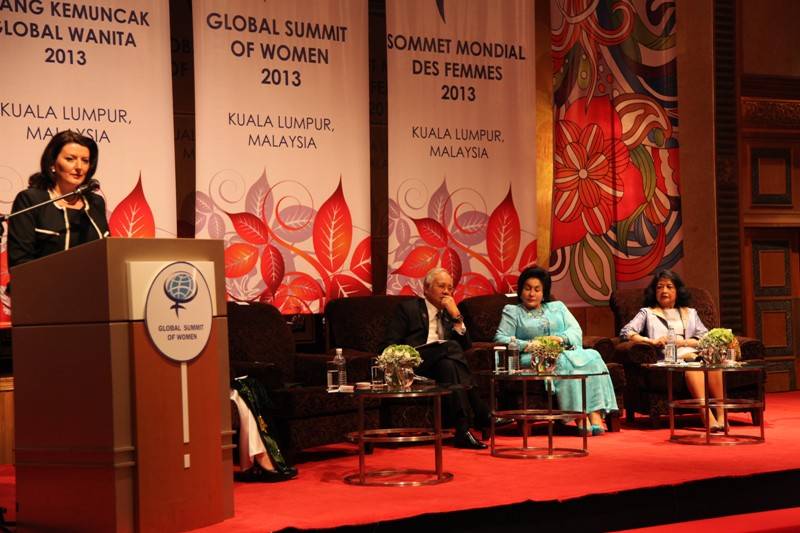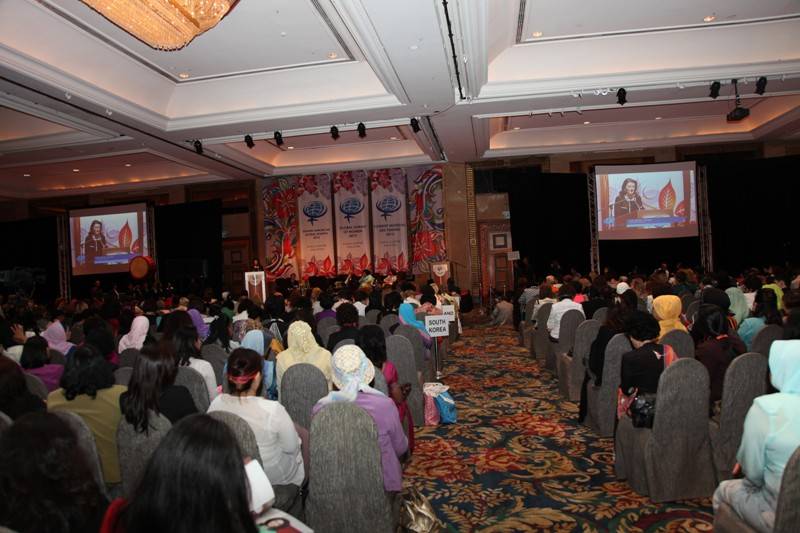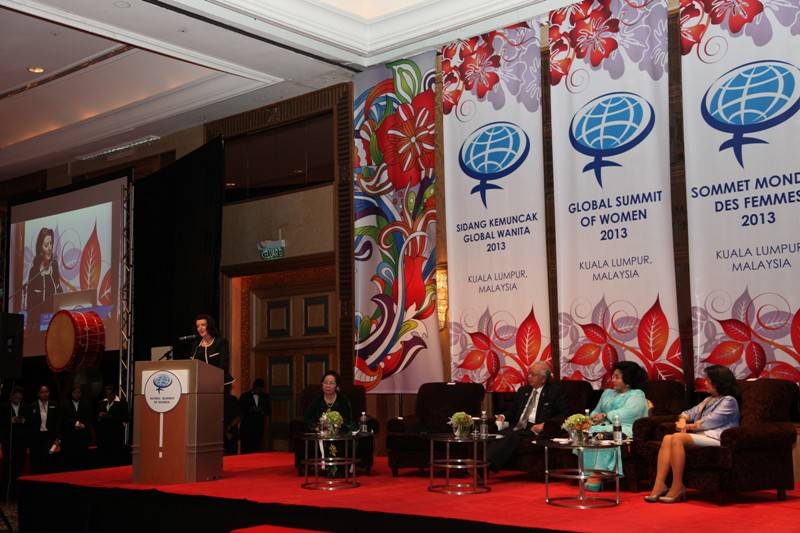President of the Republic of Kosovo, Mrs. Atifete Jahjaga, participated today at the official opening ceremony of the proceedings of the Global Summit of Women, where she held the key-note opening speech, joined by the Vice-President of Vietnam Nguyen Thi Doan and Prime Minister of Malaysia Dato’ Sri Mahd Najib Bin Tun Abdul Razak. As part of the Kosovar delegation, the opening ceremony was also attended by the Chairwoman of the Women Chamber of Commerce of Kosovo Afërdita Saraçini-Kelmendi and the representative of the network of the Women Groups Network of Kosovo, Mirlinda Kusari-Purrini.
Following is the speech delivered by President Jahjaga at the opening ceremony;
Honourable Ladies and Gentlemen,
Participants of the summit,
It is with great pleasure that I address you, women from all corners of the world, gathered in this wonderful place, determined to bring forth the change you want to see in your societies, change which shall shape the world we live in.
I feel proud to see so many brave women who have taken the courageous decision to take their fate in their own hands, to decide for themselves and show to the whole world that gender equality is not only a moral imperative but the only way to sustainable development of our societies.
I would like to congratulate the organizers of this wonderful women’s business Summit, which this year marks its 23rd anniversary. Global Summit of Women have done an impressive work throughout these years by showing that women are key drivers of economic growth; transforming this platform into the global event of the year for women entrepreneurs, the result of which we are witnessing every day.
Regardless of our background, of our path to becoming leaders in politics, of our struggles to set up a business or engage in advocacy or apply strict ethics and set an example of how one behaves when vested with public authority, we have been united in our mission: to empower women to become masters of their own fate.
You have demonstrated the kind of change, vision and leadership that is necessary at this time. A time when we must have more equality, more opportunities, more sustainable access to resources and more balanced policies.
A time when we need greater say in the public sphere, greater political representation, greater chances in securing a livelihood for our families and a greater role in establishing and maintaining the foundations of a just society.
This platform of ideas and visions, best practices and strategies, networks and partnerships where women cross borders and differences, rigid ideologies and narrow politics, speaking with one voice, offers a blueprint for improving the lives of each and every one of you. And you will in turn affect the lives of many others. For women are pillars: every decision they take benefits the wellbeing of the child, the family, the community, the society and the country itself.
You will leave this Summit empowered. And you will have gained the means to empower many others in your community by expanding your businesses and employing many more and by further investing in the education of your children and raising your daughters and sons as equals.
For women are the agents of change Women are the societies itself.
I strongly believe that investing in women is fundamental to driving the social and economic change we need as global societies. I encourage you to be fearless and trust in your transformative powers.
Every day we are faced with tons of research, facts and experiences which show that women’s economic potential are essential to all types of economies and by increasing the level of women employment rate to that of men, we will guarantee faster pace of economic growth.
The exclusion of women from the economic development of a country impoverishes the country itself.
The economic and political empowerment of women is fundamental for peace and democracy; it is fundamental for sustainable development and social justice and it is fundamental to reducing poverty and achieving economic growth. And this is a common denominator of post-conflict societies and societies in transition and of developing and developed countries. It is imperative and smart to add the talent of women in the equation to find solutions to our common challenges.
In a world of depleting resources, global recession and ever growing interdependence, the role of the woman is inseparable to the pace of our development. Women are considered ever more as drivers of economic development.
Women are half of our society and they represent half of the human capital of any country. The talent and skills that women can bring to the workforce can answer the needs of ever increasing competitive markets.
We see how women entrepreneurs are driving the economic growth in developing countries where women own up to forty percent of small and medium sized enterprises which represent the engines of our economies.
The economic empowerment of women is no longer only a smart business choice but also a smart business priority because their spending power gives them agency, which should not be ignored. Women are becoming the world’s largest consumers and it becomes imperative to include women in corporate boards and senior positions.
While we have expected that the economic and social arguments would bring the necessary change in attitudes and perceptions on the role of women in our societies resulting in greater numbers of women representation in the rooms where policies are designed and decisions are taken. Women still remain under-represented and underutilized in private and public arena.
Women are still seen in their societies solely as caregivers of their families and supporters of their husbands. Yet we see every day how women take decisions which impact the wellbeing of their families. We see every day how women can be both, caregivers and decision makers.
As my dear friend the former Secretary of State the Honourable Hillary Clinton has said: Women are not victims. We are agents of change. We are drivers of progress”.
Indeed women, as stakeholders of societies, are every day playing their role in fighting for human rights, preventing conflicts, easing transitions, building democracies and reviving shattered economies.
Dear Ladies and Gentlemen,
We enter this century with astonishing achievements in creating a gender diverse environment. Yet still in our world disparities are dramatic. In one corner of the world there are women and girls who are killed for pursuing education, women who are stoned to death, women who are deprived of every right. Of human dignity.
In this Summit where we are celebrating the milestones, we need to recognize their pain and sufferings. In the words of my friend Congresswoman Harman: “we can no longer point to the problem, we need to find a solution”.
We need to find the courage in each and every one of us to close these disparities. We need to understand that they are us and we are one!
The challenges that women face today around the world range from human right to discrimination at the labour market.
I have seen the power that women have in changing the course of history.
In Liberia women who were victims of unspeakable violence, brought to an end a fourteen year long civil war that left behind two hundred and fifty thousand dead.
In the streets of Egypt, women raised their voices and topple a cruel dictator.
In Bosnia and Herzegovina, the decade long persistence, of women of Srebrenica, to finds the bones of their eight thousand men and boys killed during the war, gave them a final resting place. They channelled their pain, their loss, in seeking justice and bringing the perpetrators to court.
Women in my country also know the sufferings of war. I would like to share with you the story of the village of Krusha, often referred to as a village without men, a small community where women were left with the burden not only to deal with the pain of loss but also with the responsibility to secure the livelihood of their families, on the ashes of war.
These women are the real heroes which do not make the news but who have broken through every barrier to preserve their families. They have taken on roles not traditionally assigned to women, like ploughing the land and promoting themselves as entrepreneurs. Changing our society forever.
Neither Kosovo not Bosnia are unique. For similar stories are abound in countries torn by the horror of war. What is powerful about their stories is that they mobilized to look towards the future, to seek opportunities to build prosperous societies and never let war shatter the dreams of the younger generation.
In other countries women’s battles have taken different dimensions. Increasingly women constitute the majority of university graduates. They represent half of the global work force yet they are still paid less than men for the same type of jobs unable to break the glass ceiling.
On average they continue to own only a few percent of property, robbed off economic security – such as starting capital, bank loans, without which they cannot engage seriously in business.
The economic empowerment of women will unleash the talent of every member of the society. For women invest the major part of their income within their household, investing in their children.
Women are not less capable than men; they are not less powerful to perform the traditional duties that are traditionally assigned to “men”. Women are the driving power of development in the society. Whenever women are independent and economically empowered, then her freedom is not deeply threatened and when her dignity is respected.
The economic independence of women is core to her development and the development of the whole society. The economic dependency of women on her family or husband or any other member of the society will keep her life in the dependency trap and we will not be able to achieve what we aim today: the empowerment of women, respect for women’s human rights and foremost gender equality.
The key in fostering prosperous societies and sustainable countries is through women’s political participation and participation in decision making, through women’s economic empowerment and access to resources and through ensuring women’s security and access to justice.
Last year I convened the first International Women’s Summit “Partnership for Change: Empowering Women” in the region. We came together to galvanize change in our societies by sharing our experiences and ways how to improve the role of women.
We need to take this three tier approach to close the gender inequalities that we find in our societies. For they are not about improving the position of women but they are about ensuring a thriving society.
Governments, business leaders and decision makers should reconsider the role they appoint to women in the institutions they lead.
Gender mainstreaming must be our objective when drafting policies, strategies and legislation to ensure that we include the needs and constraints of men and women taking into consideration their capacities and contributions to create balanced policies.
We need to shift cultural attitudes and social norms which consider women’s role in the society as subordinates. We need to consider women’s role as essential and equal to that of men when deciding how we will run our country and when forecasting the development of our economies.
Sometimes we may need to rely on temporary bandage such as quotas to increase women’s representation in public and private sectors, facilitating a more rapid inclusion of women in all segments.
Through quotas we are not striving to increase the quantity of women but we are striving to increase the diversity and quality of our decision making and board rooms. In this new era of technology, when we are understanding that every individual is an added value and as we encourage innovation to solve poverty, the ripple effects of climate change, access to clean water and prevention of pandemics that threaten the lives of all.
We need to close the gap that still remains between women and financial resources, between women’s potential and their expected role by the society.
We should support it by inciting more women to enter paid labour market, enter workforce, dare to set bold goals for themselves, become part of decision making in their societies.
On all these issues we need more legislation, best practices and better implementation.
But above all, as I have said before we need a critical mass for a cultural shift. We need a common platform and a joint commitment to see these reforms through in our respective communities. We must show the kind of courage that has radically transformed our societies. And above all, we must demonstrate solidarity and unity.
I encourage you to explore partnerships that will boost the role you will play in the future of your countries where none existed before: between academia and policy makers, between enterprises and public offices, between nations and neighbours.
We should continue to embark on new initiatives and make our case on promoting women’s empowerment throughout the world.
We should continue to make the case for empowering women because we want to see every individual in our society enjoy their God given rights and use their God given potential.
We should continue to make the case for women since we want our children to earn better education, for we want to see our families stronger, for we want to see our societies flourish and our countries prosper. For we want peace to rein.
Thank you!

